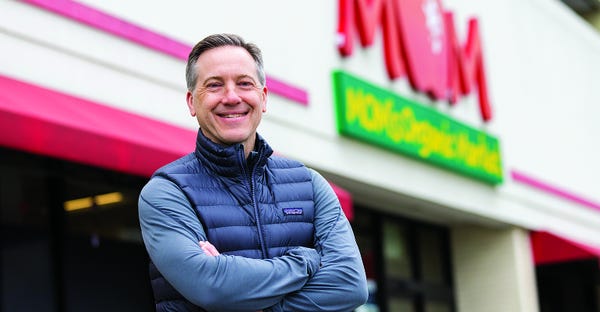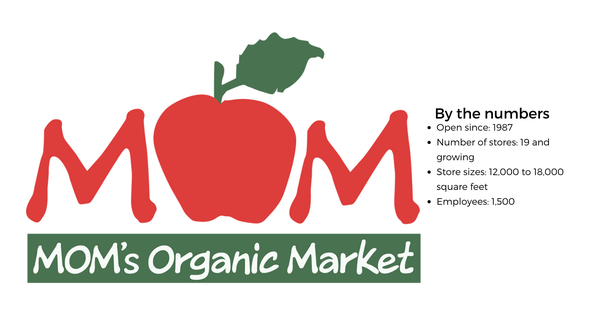February 19, 2020

Now into his fourth decade in the natural products industry, Scott Nash is widely viewed as a legend and a pioneer in promoting organic food and fighting to protect our fragile environment.
At just 22 years old, he launched a popular organic-produce delivery service, MOM’s Organic Market, which eventually evolved into brick-and-mortar retail. Today, there are 19 MOM’s stores spread throughout greater Washington, D.C., Baltimore, Maryland, and Philadelphia, Pennsylvania, with more locations set to open soon.
Through his stores’ progressive eco-mission and his own personal actions, Nash continues to lead our industry in challenging conventional wisdom and changing common narratives that ultimately harm our planet. Natural Foods Merchandiser had the pleasure of chatting with Nash recently about how he embodies MOM’s mission “to protect and restore the environment” and how retailers and consumers can do their part.
What inspired your passion for organic food and prompted you to start delivering produce in 1987?
Scott Nash: I came from a family of early adopters; it was part of our culture to be interested in things outside of the mainstream. So 30-something years ago, we were into organic. I was working for an organic food place and shopping at an organic food place, and I always wanted to be self-employed, so it was the combination of those factors that led me to start the business.
Is the environmental aspect the main driver of your steadfast belief in organic food?
SN: Yes, I have always been an environmentalist. The health benefits and quality of organic products are also so important, but today I’d say that my passion is 90 percent driven by environmental reasons.

Are you surprised to see organic’s widespread adoption today?
SN: I’ve always known one thing: Organic will continue to grow. About 20 years ago when Whole Foods Market came in, I could see [this growth] coming. I remember telling a potential investor 10 or more years ago that one day organic food would be everywhere—and I still expect it to keep trending, keep growing and become even more mainstream. But if the chemical farming lobby keeps getting subsidies, that will protect them against organic being priced more fairly to compete and will be an obstacle to organic totally overtaking our farming industry.
What does your work life consist of today? Do you travel a lot from store to store?
SN: I am responsible for the MOM’s brand, our strategy and our culture. Our brand has a lot to do with the customer experience, the design and layout of stores and our messaging. For the most part, the customer experience is something I define but don’t execute. As for culture, I created our values and purpose, which is to protect and restore the environment. And I define our strategy: how much are we going to grow, how our business will be structured, etc.
How would you describe MOM’s culture?
SN: We all generally share a worldview, which is that we are environmentalists and into mindfulness and the spiritual journey. Obviously, we are also into organic food, healthy eating and the movement to switch acreage from chemically farmed to organically farmed. When you get people together who share those ideals, the rest falls into place. We make sure these ideals are included in our hiring practices and that our training focuses on these values. When we give performance reviews, we talk about how people are doing regarding values and culture. It’s not a wish list—we live these ideals. People definitely apply to work for us because of our values and culture.

You recently ate expired food for an entire year. What inspired this initiative?
SN: I don’t consider myself a cheap person, but I am someone who despises waste. It is painful to waste a dollar; it is painful to waste resources—and it takes a lot of resources to produce food. As a grocer, when shopping our stores, I always look at dates because I want to take the older items and leave the newer foods for customers. Knowing an item will be thrown away because it’s nearing or past its expiration date, I’ll take it home and eat it. In doing this for so long, I realized that expiration dates [for many foods] are worthless and not rooted in reality. Neither are the “sell by,” “use by” and “best by” dates.
So I didn’t really make the determination to eat expired food for a year; I just documented what I was already doing and shared about it in detail on my blog. I didn’t eat only expired food—that would be almost impossible to do—but I ate a lot of it. And I only documented the foods that were really edgy, things that were either way past their date or often thought to go bad very soon after their date.
And you garnered lots of attention doing this?
SN: It went viral across the world, reported on in every continent except Antarctica. I did a lot of live interviews on national TV and radio and all across the world. One video, on Now This, is up to 1.4 million views. And I was reading the Sunday funnies a few months ago and saw a comic strip about me eating expired tortillas, which is something I wrote about a year ago. This story just keeps rolling along.
What do you hope people will learn?
SN: I feel like it has changed the narrative and brought this issue to the forefront. Some of the people who wrote stories about me also interviewed trade organizations, so they are aware of it. There is a false narrative that these dates are rooted in reality or about food safety and products going bad, but oftentimes they are there just because manufacturers want you to eat their food at peak quality. That’s one thing, but it doesn’t mean you have to throw the food out. It has created a narrative that this food is no longer good and if people eat it, they’ll end up in the hospital. But there are also dates on items that never go bad, like salt and baby wipes—you have to be joking! This has to be rooted in bad intentions on the part of manufacturers. Like many narratives, this one doesn’t get challenged enough, and this is my way of challenging convention.
In what other ways does MOM’s champion environmental stewardship?
SN: We are very committed to fighting climate change through renewable energy, energy efficiency and reducing plastics—those are the main things we fight for in our stores. For example, we banned plastic bags and plastic water bottles long before other grocers of our size. We also partner in a large solar farm that offsets energy usage in our stores. Investors bought the land and constructed the solar farm but couldn’t do it without us agreeing to buy all the energy, so we did.
Outside of MOM’s and your environmental activism, what floats your boat?
SN: I am a pinball enthusiast. I play competitively, collect machines and have a pinball parlor at our College Park, Maryland, store. I am pretty low-key. I love my house and my kitchen. My work life is also very robust and vibrant, so overall, I have a rather incredible life.
About the Author
You May Also Like
.png?width=700&auto=webp&quality=80&disable=upscale)



